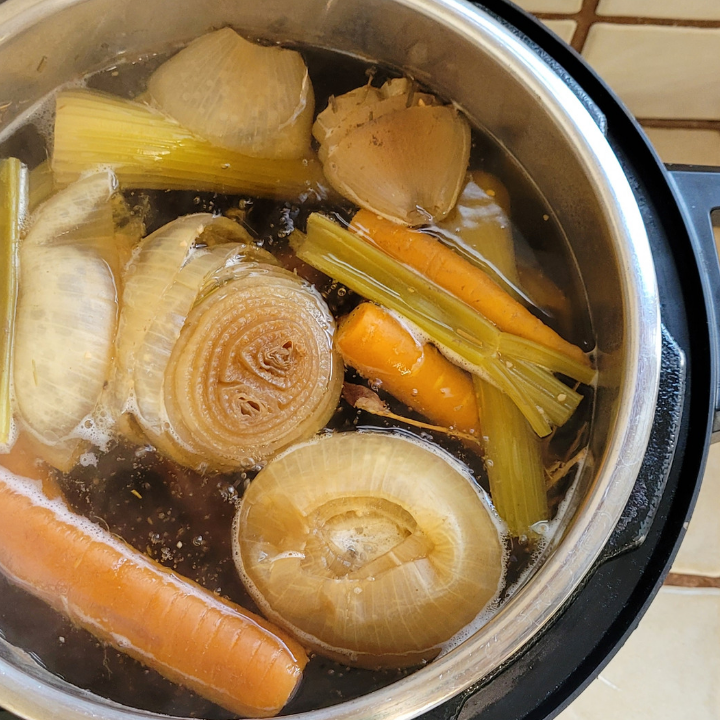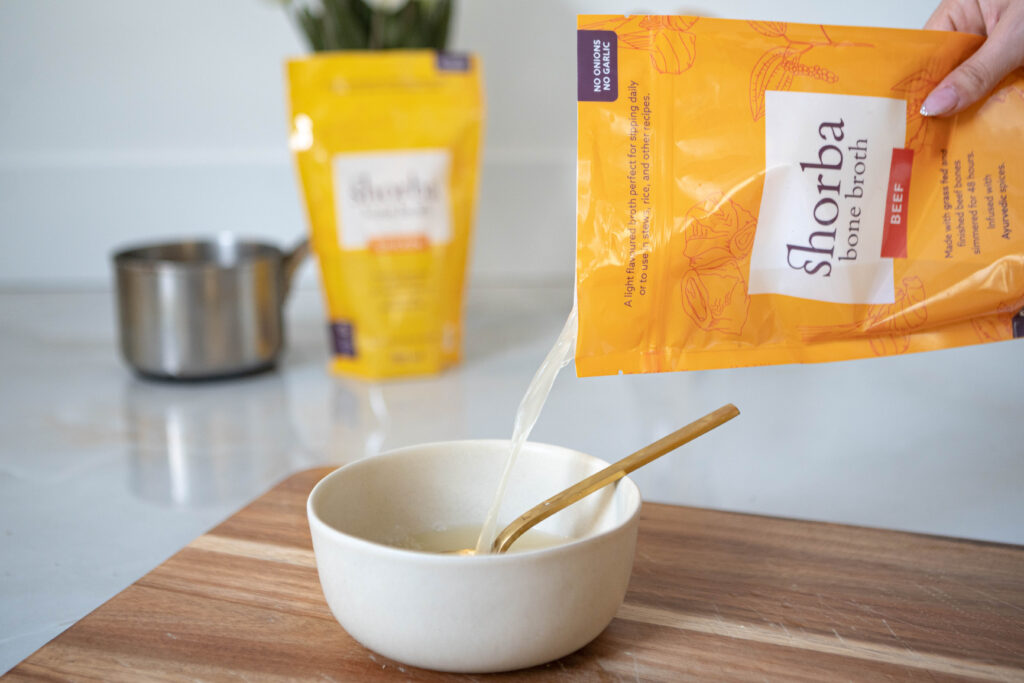Revealing Everything About Bone Broth: Its Function in Health and Wellness for All Ages
Bone broth has gotten interest for its abundant nutritional account and prospective health benefits (bone broth for toddlers). This nutrient-dense liquid is crafted from simmering animal bones and connective tissue, offering a mix of collagen, amino acids, and essential minerals. It serves different purposes throughout different life phases. Nonetheless, the specifics of its health and wellness benefits and the finest means to integrate it into daily meals continue to be to be explored. What makes it a staple for many?
What Is Bone Broth and Exactly How Is It Made?
Bone broth is a nutrient-rich liquid made by simmering pet bones, connective cells, and sometimes meat for an extensive duration. This conventional cooking practice has been made use of for centuries throughout various cultures, mainly for its taste and health and wellness benefits. The procedure begins with choosing premium bones, frequently from pets like hen, beef, or fish, which are after that integrated with water and acidic ingredients such as vinegar or lemon juice. This acidity aids remove minerals and collagen from the bones throughout the simmering process, typically lasting anywhere from a number of hours to days. Different vegetables and natural herbs may be added for taste and extra nutrients. When prepared, the mix is stressed to eliminate solid parts, leaving behind a rich, gelatinlike broth. The resulting fluid can be taken in by itself or utilized as a base for soups, stews, and sauces, making it a functional enhancement to lots of recipes.
Nutritional Profile of Bone Broth
The nutritional account of bone broth reveals a wide range of useful parts that contribute to its reputation as a health-enhancing food. Rich in collagen, bone broth offers necessary amino acids, such as glycine and proline, which play significant roles in keeping healthy connective tissues. Additionally, the broth gives minerals, consisting of calcium, magnesium, phosphorus, and potassium, which are vital for bone health and wellness and total physical functions.
The visibility of gelatin in bone broth aids digestion and sustains digestive tract health and wellness by advertising the honesty of the intestinal tract lining. Moreover, different nutrients and antioxidants can emerge throughout the simmering procedure, including to its nutritional value. Bone broth additionally uses low-calorie hydration, making it an enticing choice for those seeking to enhance their nutrient intake without excessive calories. Generally, this nutrient-dense food functions as a versatile enhancement to numerous diet regimens.
Health Perks of Bone Broth
Bone broth is renowned for its nutrient-dense structure, providing a rich source of nutrients advantageous for overall wellness. Its special buildings support joint and bone wellness, making it a preferred option amongst those seeking relief from pain. Furthermore, bone broth help the gastrointestinal system, enhancing gut health and advertising much better nutrient absorption.
Nutrient-Dense Structure
While numerous foods assert to offer health and wellness benefits, few can match the nutrient-dense make-up of bone broth. Rich in vital nutrients, bone broth gives a concentrated source of vitamins, minerals, and amino acids essential for total health. It includes collagen, which can sustain skin flexibility and promote gut health and wellness, in addition to glycosaminoglycans that aid in cellular function. Furthermore, the existence of minerals such as calcium, magnesium, and phosphorus adds to numerous physical features. Bone broth is also reduced in calories yet high in protein, making it a nourishing option for those seeking to enhance their diet plan without excess calories. This multifaceted nutritional profile makes bone broth an attractive option for individuals of any ages seeking to boost their wellness and health.
Joint and Bone Wellness
Rich in collagen and glycosaminoglycans, bone broth plays a substantial role in promoting joint and bone health. The collagen found in bone broth helps maintain the honesty of cartilage material, which supports joints and stops damage. Furthermore, glycosaminoglycans, such as hyaluronic acid, contribute to joint lubrication and flexibility, boosting flexibility and lowering discomfort linked with joint inflammation. Routine consumption of bone broth may additionally sustain bone thickness as a result of its mineral web content, consisting of calcium, phosphorus, and magnesium, which are necessary for strong bones. These nutrients function synergistically to relieve swelling and advertise healing in the musculoskeletal system. Including bone broth right into the diet might subsequently supply a natural strategy to preserving joint and bone health you could look here throughout different life phases.
Digestive System System Support
Supporting digestive system health and wellness, bone broth is a nutrient-dense fluid that uses several advantages for the intestinal system. Rich in collagen, it aids in the fixing of the digestive tract lining, which can be especially advantageous for people struggling with problems such as leaking intestine syndrome. The jelly found in bone broth aids to absorb water and nutrients, advertising optimal food digestion and reducing inflammation in the intestine. Additionally, bone broth is a resource of important amino acids, which play a crucial duty in preserving a well balanced microbiome - bone broth for kids. Its relaxing residential or commercial properties can likewise alleviate digestion pain and assistance overall intestine health. Integrating bone broth into the diet regimen might enhance digestion and add to a much healthier, extra resistant digestive system
Exactly How Bone Broth Supports Digestive Tract Wellness
Bone broth supplies a distinct combination of nutrients that can considerably improve digestive tract health and wellness. Rich in collagen, jelly, and amino acids, bone broth sustains the honesty of the intestine cellular lining. Collagen and jelly aid to fix and keep the mucosal obstacle, which is crucial for preventing leaky gut syndrome. Furthermore, amino acids like glutamine play a necessary function in digestive tract function by offering energy to intestinal cells and supporting their regrowth.
The visibility of minerals such as calcium, magnesium, and phosphorus more adds to digestive tract health by promoting ideal food digestion and absorption of nutrients. Bone broth additionally includes glycosaminoglycans, which assist to decrease swelling in the intestine, cultivating a balanced microbiome. This combination of nutrients not only help view food digestion yet additionally reinforces the body immune system, making bone broth a helpful addition for individuals looking for to enhance their general digestive tract wellness and health.
Integrating Bone Broth Into Your Diet
Including bone broth right into one's diet can be both straightforward and functional. Different dish ideas, everyday serving suggestions, and imaginative cooking applications can boost meals while providing health and wellness benefits. Discovering these options permits individuals to effortlessly incorporate bone broth right into their culinary routines.
Straightforward Recipe Concepts
Lots of people are discovering the flexibility of bone broth as a nutritious enhancement to their dishes. It can effortlessly improve various meals, boosting both flavor and health and wellness advantages. Using bone broth as a base for soups and stews adds deepness and splendor while providing vital nutrients. Additionally, it can be integrated right into risottos, replacing water for a creamier texture. Lots of additionally find success using bone broth in sauces and gravies, enhancing their preference accounts. For those looking for a quick snack, sipping cozy bone broth spiced with natural herbs and seasonings offers a reassuring choice. It can be mixed right into shakes for an unanticipated dietary increase, showcasing its versatility in day-to-day food preparation.
Daily Portion Suggestions
When taking into consideration just how to flawlessly incorporate bone broth right into everyday meals, individuals can explore a this contact form variety of approaches that enhance both nutrition and taste. One reliable technique is to utilize bone broth as a base for soups and stews, offering a rich, savory structure. In addition, integrating it into food preparation grains, such as rice or quinoa, adds depth and nutrients. Bone broth can additionally be taken in on its own as a cozy beverage, providing a comforting and beneficial choice. For those who delight in smoothies, a percentage of bone broth can be added for an added healthy protein boost. Ultimately, using it in sauces or gravies can raise everyday dishes while improving their nutritional account.
Innovative Food Preparation Applications
Bone broth offers flexible possibilities for innovative food preparation, permitting home chefs to check out cutting-edge methods to boost their meals. It can act as a savory base for soups and stews, enriching the depth of taste while giving important nutrients. Furthermore, bone broth can be made use of in risottos, replacing water or stock to pass on better splendor. For those seeking lighter fare, it can replace oil in sautéing vegetables, including both dampness and taste. Furthermore, home bakers can integrate bone broth into bread dishes, producing an one-of-a-kind texture and nutritional profile. This active ingredient additionally beams in sauces and sauces, where it brings a savory complexity that elevates any dish, making it a valuable enhancement to numerous cooking productions.
Bone Broth for Various Age and Lifestyles
Nutrient-rich and flexible, bone broth interest a large variety of age groups and lifestyles. For babies, it functions as a beneficial addition to pureed foods, offering important minerals for growth. Toddlers, often picky eaters, can take advantage of its tastes and nutrients, urging much healthier eating habits. School-aged youngsters, taken part in active play, find bone broth a fantastic resource of hydration and power.

Regularly Asked Questions
Can Bone Broth Be Frozen for Later Usage?
The inquiry of whether bone broth can be frozen for later use is frequently asked. Yes, it can be iced up, enabling convenient storage and preservation of its nutrients for future cooking applications or intake.
The Length Of Time Does Homemade Bone Broth Last in the Refrigerator?
Homemade bone broth usually lasts in the fridge for regarding 3 to 4 days. Effectively saving it in an impermeable container can aid maintain its quality and protect against putridity within this time around framework.

Exist Vegetarian Alternatives to Bone Broth?
The concern of vegetarian alternatives to bone broth often arises. bone broth for toddlers. Options consist of vegetable brews made from simmered veggies, natural herbs, and flavors, providing a flavorful base for soups and stews without animal-derived active ingredients
Can I Utilize Bone Broth in Baking Recipes?
Bone broth can be made use of in cooking recipes to boost flavor and moisture. It offers a tasty depth to breads, soups, and sauces, though adjustments might be necessary to stabilize liquid and flavoring in the recipe.
Exists a Difference In Between Store-Bought and Homemade Bone Broth?
The difference between store-bought and self-made bone broth lies mostly in quality and flavor. Self-made variations often include fresh active ingredients and adjustable seasoning, while store-bought alternatives may consist of chemicals and lack the abundant preference of home preparation.